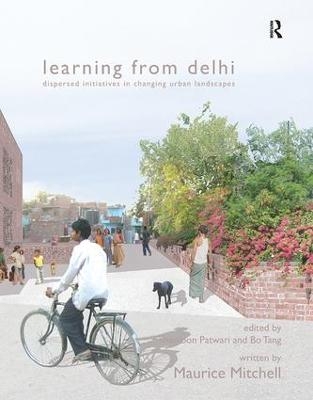
Learning from Delhi
Routledge (Verlag)
978-1-138-40545-5 (ISBN)
The inflexibility of modern urban planning, which seeks to determine the activities of urban inhabitants and standardise everyday city life, is challenged by the unstoppable organic growth of illegal settlements. In rapidly expanding cities, issues of continuity with local traditions, local conditions and local ways of working are juxtaposed with those of abrupt change due to emergency, reaction to modernity, environmental degradation, global market forces and global technological imperatives to make efforts to control by physical planning redundant as soon as they are enacted. In most third world cities there is little social welfare and almost no attempt at social housing. The urban poor must still house themselves with little or no state help to procure land or infrastructure. Not having a legal existence, 'slums' are automatically swept away to create a 'tabula rasa' prior to a complete new build for those who can afford the full cost. The notion of upgrading the existing built environment, has hardly entered the official planning vocabulary. Since 2002, both Diploma and latterly Degree students from London Metropolitan University Department of Architecture and Spatial Design have produced schemes from research work generated during an annual field trip to India. Work is focused on situations where rapid cultural and technical change is affecting traditional or transitional communities who have access to only limited resources. Sites have included post earthquake desert locations in Gujarat, under-serviced urban slums in Delhi, dense traditional city landscapes in Meerut and the integration of Marwari nomads into a settlement in Agra. This has proved a stimulating and provocative academic learning environment producing a range of innovative work. Some of the students involved have been awarded RIBA medals and other prestigious student prizes. In the course of this enterprise, links with Indian non-government organisations and architectural schools have devel
Maurice Mitchell is Reader at the Department of Architecture and Spatial Design at London Metropolitan University. He has also taught at the Architectural Association, Oxford Brookes University and the Development Planning Unit, University College London.
Contents: Preface; Forewords; Introduction; Part I Setting the Scene: Field research; Methods (and modernity). Part II Essays: Delhi 'slums': red lines and high walls; The waste pickers of Panchseel Vihar; Havelis and the conglomerate matrix; Urban nomads; Climate, density and construction; Place, space and services; The relevance for architectural education in the UK. Part III Catalogue of Selected Students' Schemes: Slums, sanitation, amenity and housing; Waste picking; Havelis; Urban nomads; Leisure and livelihoods; Live projects; Students and projects 2002-2010; Glossary; Bibliography; Index.
| Erscheinungsdatum | 07.08.2017 |
|---|---|
| Verlagsort | London |
| Sprache | englisch |
| Maße | 218 x 279 mm |
| Gewicht | 453 g |
| Themenwelt | Naturwissenschaften ► Biologie ► Ökologie / Naturschutz |
| Naturwissenschaften ► Geowissenschaften ► Geografie / Kartografie | |
| Technik ► Architektur | |
| ISBN-10 | 1-138-40545-0 / 1138405450 |
| ISBN-13 | 978-1-138-40545-5 / 9781138405455 |
| Zustand | Neuware |
| Haben Sie eine Frage zum Produkt? |
aus dem Bereich


